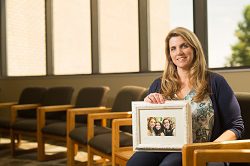Amanda Laws
Conquering Cancer with Information
Knowledge is empowering, sometimes even lifesaving.
Amanda Laws, a St. Elizabeth Physicians Practice Manager, will tell you it likely was for her.
In 2010, doctors diagnosed Laws’ mother with stage 4 ovarian cancer. Conversations about the family’s health history raised concern. Laws’ grandmother died of breast cancer in her 40s, and her great-grandmother died of ovarian cancer at roughly the same age.
All signs pointed to a hereditary cancer risk and a need for genetic testing. For help, Laws turned to the genetic counselors at St. Elizabeth.
“I was watching my mom basically fight for her life,” she says. “Having small children at home, I thought this was really something I needed to face head-on.” She didn’t want her own children possibly having to watch her go through a similar fight in the future.

Make an appointment
For more information, please contact your oncologist or the Cancer Care Center at (859) 301-4000
Personalized Prevention
Genetic counseling is precision medicine at its best. It involves looking at people’s histories and genes to determine if they could be at high risk for serious medical conditions, then tailoring management of their risk.
When it comes to cancer, prevention is key.
“That’s always our goal,” says Jaime Grund, Coordinator of Clinical Genetics at St. Elizabeth.
Many genes linked to cancer normally help defend the body from the disease.
“They put the brakes on cell growth,” explains Grund. “If you have damage, or a mutation, in that gene, it won’t work properly.” That increases the risk of a tumor.
Having gene mutations doesn’t mean you’ll get cancer. But it does mean you should be proactive.
That might include earlier or more frequent cancer screening than what experts generally recommend. Medication to lower risk or preventive surgery might also be options. That could be a mastectomy—removal of the breasts— for example, or a hysterectomy—removal of the female reproductive organs.
“There is no one-size-fits-all treatment,” says Grund. “It’s personalized for you and your motivations.”
Right for You?
St. Elizabeth has been a leading provider of precision medicine, offering genetic counseling since 2003. According to Grund, you should consider testing for hereditary cancer risk if:
- People in several generations of your family have had the same or similar cancers.
- You have had cancer before age 45.
- You have had more than one type of cancer.
The process is simple. You first meet with a counselor to discuss your background and why you want screening. The counselor will address the biology of genetics as well as the emotional impact of testing and what testing might mean for you.
If you decide to proceed, you provide a blood or saliva sample. Usually, you get your results within three to four weeks. Should the tests find mutations, counselors will invite you to return to talk more about your options. They may also refer you to a physician.
Even negative results deserve attention, however. When there’s a strong family history of certain cancers in the family, counselors may recommend increasing screening tests or taking other proactive steps even in the absence of gene mutations.
“We don’t ignore the family tree just because the mutation is not there,” says Grund.
A Family Affair
Laws’ tests revealed mutations in BRCA genes, which are linked to breast and ovarian cancers. Her mother and a few other relatives tested positive for BRCA mutations as well.
Two relatives were free of the BRCA mutations, but additional tests showed they carried mutations in another gene—RAD51D, which has been linked to ovarian and possibly other cancers—that put them at risk. And later, testing identified yet another potentially dangerous gene variant. All her relatives chose for themselves how to address their risk.
Laws had a double mastectomy with breast reconstruction and a full hysterectomy. When pathology reports showed she had precursors of breast cancer, she knew she’d made a good choice.
Taking Control
It hasn’t been easy, but Laws can’t say enough about the help she received at St. Elizabeth.
“The genetic counselors here are amazing,” she says, explaining how they tested her at her mother’s bedside during her chemotherapy treatments and worked with her extended family. “They made it completely convenient.”
While things worked out well for her, this may be the best news — despite long odds, Laws’ mother is still with her today. Thanks to the counseling she received, Laws plans to be here for her own daughters well into the future.
“What a great tool for us to have to stop this [cancer] and be able to take control,” she says. “It really can be lifesaving.”
You can learn more about precision medicine by scheduling an appointment with one of our certified genetic counselors. Call (859) 301-4363.

